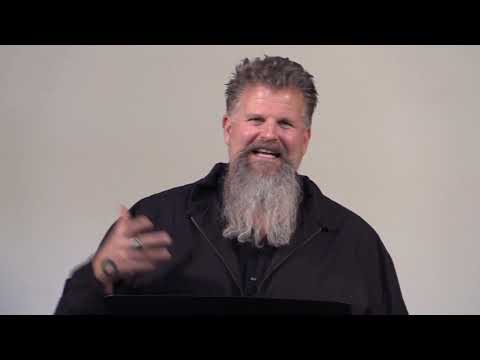
Luke 1:18-34 Bible Teaching
Shawn teaches Gabriel's announcements of John and Jesus' births, emphasizing divine favor, angelic roles, and Jesus' spiritual kingdom, challenging Trinitarian views.

Shawn teaches Gabriel's announcements of John and Jesus' births, emphasizing divine favor, angelic roles, and Jesus' spiritual kingdom, challenging Trinitarian views.

The teaching highlights that Easter blends pagan and Christian traditions, emphasizes daily Christian living over specific observances, and stresses faith over law for righteousness. Christ's crucifixion is seen as a substitutionary atonement, fulfilling the curse of the law, and faith connects believers to the Holy Spirit, fostering genuine love.

Shawn's teaching on Luke 1:6-17 highlights John the Baptist's divine role, filled with the Holy Spirit from the womb, preparing the way for Jesus, emphasizing righteousness and God's plan.

Shawn teaches that true righteousness comes from faith, not the law, as shown by Abraham. Faith aligns believers with God's promises, justifying them through grace, not deeds.

Shawn's teaching highlights Luke's identity as a likely proselyte, educated in Greek, with connections to Paul. The Gospel of Luke is orderly, universal, and aimed at non-Jews, featuring unique parables and miracles. Written around 60-63 A.D., it addresses Theophilus, providing a historically accurate account of Jesus's life.

Paul warns Galatians against false teachings, emphasizing faith in Jesus for righteousness. Shawn highlights Jesus' crucifixion as redemption, freeing believers from sin.

Shawn's teaching on II Corinthians 13:1-6 highlights Paul's warning to the Corinthians about discipline, self-examination, apostolic authority, and the Trinity's role in faith.

Paul and Shawn teach that believers are spiritually reborn through Christ's crucifixion, living by faith, not law, with Christ's Spirit within, reflecting His love and humility.

Shawn's teaching highlights the struggle against legalism, emphasizing faith in Christ over law adherence. Justification and righteousness come through faith, not the law, promoting spiritual freedom and transformation.

Paul defends his apostleship to the Corinthians, balancing humility with authority, emphasizing spiritual edification, integrity, and unity, while addressing financial concerns and urging moral correction.

Paul confronts Peter for hypocrisy, emphasizing direct conflict resolution. Shawn teaches love and faith over fear. Hypocrisy is criticized; faith in Christ, not law, saves.

God's grace suffices; strength in weakness. Trust His will, not all prayers answered. Jesus' authority, worship Him. Embrace weakness, rely on grace for strength.

Shawn's teaching highlights Paul's defense of Gospel integrity against Mosaic law imposition on Gentiles, his independent apostolic authority, and the Gospel's universal yet adaptable nature.

Paul defends his apostleship through personal suffering, visions, and revelations, emphasizing humility. He describes being caught up to the third heaven, highlighting spiritual experiences over boasting. He acknowledges a "thorn in the flesh" to prevent pride, teaching that trials foster humility and spiritual growth.

Paul's visit to Jerusalem aimed to meet Peter and James, emphasizing his independent gospel revelation. He opposed imposing Jewish laws on Gentiles, advocating freedom in Christ.

Paul defends his apostleship by highlighting shared Jewish heritage, surpassing dedication, and enduring hardships, using his sufferings as testimony against false apostles.

Paul labors in Corinth without financial support to avoid accusations, contrasting with false apostles. Shawn warns against deceptive appearances and emphasizes true character.

Paul's apostolic authority and gospel were received directly from Jesus, not humans. His mission to the Gentiles was independent of Jewish apostles, emphasizing divine revelation.

Shawn highlights Paul's defense of his Apostolic role, his godly jealousy for the Corinthians, and the dangers of deviating from the simple gospel of Christ.

Shawn's teaching highlights Paul's astonishment at the Galatians' quick abandonment of the true gospel, emphasizing its divine origin and the dangers of adding to it.

Paul's authority from God for edification, not destruction; consistent mission; criticized for appearance/speech; genuine gospel spread; no boasting; integrity in work.

Paul's Letter to the Galatians warns against legalism, emphasizing salvation by faith in Jesus, not by law. It defends Paul's divine apostleship and the gospel's purity.

Paul defends his authority, emphasizing spiritual strength from God, not appearances. Engage in spiritual warfare with love, prayer, and humility, not aggression.

Paul instructed Corinthians on charity, collection logistics, strategic mission work, vigilance in faith, and authenticated his letter with a personal signature, emphasizing love and unity.

Paul teaches transformation to incorruptibility at Jesus' return; Shawn emphasizes spiritual victory over sin and death through Jesus, focusing on spiritual resurrection.

Shawn critiques Paul's request for Corinthians' support, noting lack of divine command and potential conflict with Jesus' teachings. Emphasizes voluntary, Spirit-led giving.

Shawn highlights Paul's gratitude to Corinthians, Kierkegaard's "fear and trembling," generous giving inspired by Macedonians, transparency in contributions, and true 'agape' love.

Paul's teaching in 1 Corinthians 15 contrasts the perishable natural body with the imperishable spiritual body, highlighting transformation through Christ from earthly to heavenly existence.

Paul emphasizes mutual trust, godly sorrow for genuine repentance, and contrasts it with worldly sorrow. His loving guidance fosters transformation, highlighting empathy and love.

Paul's teaching in 1 Corinthians 15 emphasizes the transformation in resurrection, where believers receive a heavenly, non-material body, distinct from Jesus' physical resurrection. He uses seed analogies to explain the transformation from earthly to spiritual bodies, highlighting varied glories and eternal differences.